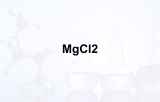Magnesium chloride (MgCl₂) is a critical component in the polymerase chain reaction (PCR), a widely used molecular biology technique for amplifying specific DNA sequences. MgCl₂ serves as an essential cofactor for the DNA polymerase enzyme, particularly Taq DNA polymerase, and plays multiple roles that influence the efficiency, specificity, and fidelity of PCR amplification.
Biochemical Role of MgCl₂ in PCR
MgCl₂ provides magnesium ions (Mg²⁺), which are indispensable for the catalytic activity of Taq DNA polymerase. These divalent cations participate directly in the enzymatic mechanism by:
- Binding to the active site of the DNA polymerase enzyme, particularly interacting with aspartate residues (Asp653 and Asp830) to facilitate catalysis.
- Coordinating with the alpha-phosphate group of the deoxynucleotide triphosphates (dNTPs), promoting the cleavage of beta and gamma phosphates and enabling the formation of phosphodiester bonds between nucleotides during DNA synthesis.
This dual role of Mg²⁺ ions is essential for the polymerase to recognize correct substrates and efficiently extend the DNA strand.
Effects of MgCl₂ Concentration Variations
Too low MgCl₂ concentration results in insufficient cofactor availability, leading to reduced Taq polymerase activity, poor primer annealing, and low PCR yield or complete reaction failure.
Excess MgCl₂ concentration can increase nonspecific binding, primer-dimer formation, and amplification of non-target sequences, reducing specificity and potentially introducing errors during DNA synthesis.
Therefore, careful titration and optimization of MgCl₂ concentration are essential for balancing PCR yield and specificity.
Summary of MgCl₂ Functions in PCR
- Cofactor for Taq DNA polymerase: Enables catalytic activity by coordinating with enzyme active site and dNTP substrates.
- Stabilization of DNA duplex: Binds phosphate backbone, reducing electrostatic repulsion and increasing primer-template Tm.
- Enhancement of primer annealing: Facilitates specific and accurate primer binding to template DNA.
- Modulation of PCR efficiency: Influences amplification yield, specificity, and fidelity depending on concentration.
Magnesium chloride is an indispensable reagent in PCR, primarily due to the magnesium ion's role as a cofactor for DNA polymerase and its influence on DNA duplex stability and primer annealing. The concentration of MgCl₂ must be carefully optimized to maximize PCR efficiency, specificity, and yield. Understanding the mechanistic role of MgCl₂ helps in troubleshooting and refining PCR protocols for diverse molecular biology applications.


